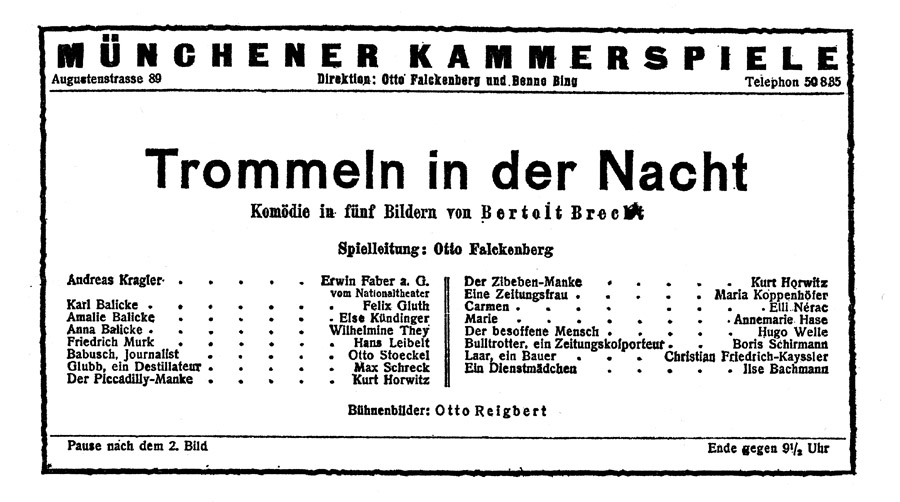|
A Respectable Wedding
''A Respectable Wedding'' is a short play by the German dramatist Bertolt Brecht. The German title ''Die Kleinbürgerhochzeit'' literally means ''the petit bourgeois wedding.'' Like other of Brecht’s early works (Baal, Drums in the Night, and ''The Threepenny Opera''), ''A Respectable Wedding'' is seen as a critique of bourgeois The bourgeoisie ( , ) is a social class, equivalent to the middle or upper middle class. They are distinguished from, and traditionally contrasted with, the proletariat by their affluence, and their great cultural and financial capital. They ... society. The play includes nine characters: *The Bride's Father *The Bridegroom's Mother *The Bride *The Bride's Sister *The Bridegroom *His Friend *The Wife *Her Husband *The Young Man References Plays by Bertolt Brecht {{Germany-theat-stub ... [...More Info...] [...Related Items...] OR: [Wikipedia] [Google] [Baidu] |
Bertolt Brecht
Eugen Berthold Friedrich Brecht (10 February 1898 – 14 August 1956), known professionally as Bertolt Brecht, was a German theatre practitioner, playwright, and poet. Coming of age during the Weimar Republic, he had his first successes as a playwright in Munich and moved to Berlin in 1924, where he wrote ''The Threepenny Opera'' with Kurt Weill and began a life-long collaboration with the composer Hanns Eisler. Immersed in Marxist thought during this period, he wrote didactic ''Lehrstücke'' and became a leading theoretician of epic theatre (which he later preferred to call "dialectical theatre") and the . During the Nazi Germany period, Brecht fled his home country, first to Scandinavia, and during World War II to the United States, where he was surveilled by the FBI. After the war he was subpoenaed by the House Un-American Activities Committee. Returning to East Berlin after the war, he established the theatre company Berliner Ensemble with his wife and long-time collaborator ... [...More Info...] [...Related Items...] OR: [Wikipedia] [Google] [Baidu] |
Baal (play)
''Baal'' was the first full-length play written by the German modernist playwright Bertolt Brecht.Willett (1967, 22-23). It concerns a wastrel youth who becomes involved in several sexual affairs and at least one murder. It was written in 1918, when Brecht was a 20-year-old student at Munich University, in response to the expressionist drama ''The Loner'' (''Der Einsame'') by the soon-to-become-Nazi dramatist Hanns Johst. The play is written in a form of heightened prose and includes four songs and an introductory choral hymn ("Hymn of Baal the Great"), set to melodies composed by Brecht himself. Brecht wrote it prior to developing the dramaturgical techniques of epic theatre that characterize his later work, although he did re-work the play in 1926. Characters * Baal - ''poet'' * Mech - ''merchant and publisher'' * Emilie - ''Mech's wife'' * Dr. Piller - ''critic'' * Johannes Schmidt * Pschierer - ''director of the water rates'' * A Young Man * A Young Woman * Johanna * Ekart ... [...More Info...] [...Related Items...] OR: [Wikipedia] [Google] [Baidu] |
Drums In The Night
''Drums in the Night'' (''Trommeln in der Nacht'') is a play by the German playwright Bertolt Brecht. Brecht wrote it between 1919 and 1920, and it received its first theatrical production in 1922. It is in the Expressionist style of Ernst Toller and Georg Kaiser. The play—along with ''Baal'' and '' In the Jungle''—won the Kleist Prize for 1922 (although it was widely assumed, perhaps because ''Drums'' was the only play of the three to have been produced at that point, that the prize had been awarded to ''Drums'' alone); the play was performed all over Germany as a result.Willett (1967, 23-24), Willett and Manheim (1970, viii-ix), and Meech (1994, 50). Brecht later claimed that he had only written it as a source of income.Willett and Manheim (1970, ix). ''Drums in the Night'' is one of Brecht's earliest plays, written before he became a Marxist, but already the importance of class struggle in Brecht's thinking is apparent. According to Lion Feuchtwanger, the play was origi ... [...More Info...] [...Related Items...] OR: [Wikipedia] [Google] [Baidu] |
The Threepenny Opera
''The Threepenny Opera'' ( ) is a "play with music" by Bertolt Brecht, adapted from a translation by Elisabeth Hauptmann of John Gay's 18th-century English ballad opera, ''The Beggar's Opera'', and four ballads by François Villon, with music by Kurt Weill. Although there is debate as to how much, if any, Hauptmann might have contributed to the text, Brecht is usually listed as sole author. The work offers a socialist critique of the capitalist world. It opened on 31 August 1928 at Berlin's Theater am Schiffbauerdamm. Songs from ''The Threepenny Opera'' have been widely covered and become standards, most notably "" ("The Ballad of Mack the Knife") and "" ("Pirate Jenny"). Background Origins In the winter of 1927–28, Elizabeth Hauptmann, Brecht's lover at the time, received a copy of Gay's play from friends in England and, fascinated by the female characters and its critique of the condition of the London poor, began translating it into German. Brecht at first took lit ... [...More Info...] [...Related Items...] OR: [Wikipedia] [Google] [Baidu] |
Bourgeois
The bourgeoisie ( , ) is a social class, equivalent to the middle or upper middle class. They are distinguished from, and traditionally contrasted with, the proletariat by their affluence, and their great cultural and financial capital. They are sometimes divided into a petty (), middle (), large (), upper (), and ancient () bourgeoisie and collectively designated as "the bourgeoisie". The bourgeoisie in its original sense is intimately linked to the existence of cities, recognized as such by their urban charters (e.g., municipal charters, town privileges, German town law), so there was no bourgeoisie apart from the citizenry of the cities. Rural peasants came under a different legal system. In Marxist philosophy, the bourgeoisie is the social class that came to own the means of production during modern industrialization and whose societal concerns are the value of property and the preservation of capital to ensure the perpetuation of their economic supremacy in society. ... [...More Info...] [...Related Items...] OR: [Wikipedia] [Google] [Baidu] |
_1988%2C_MiNr_Block_091.jpg)


